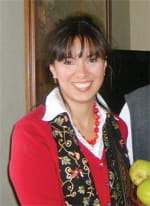
Ivy Zwicker ’07, MBA, is always on the move. At the Autism Treatment Center in San Antonio, Texas, she’s risen from an entry-level position to become the director of operations overseeing all business functions for six group homes, a school, and an outpatient rehabilitation facility serving both adults and children.
But Zwicker, who also holds a bachelor’s degree in psychology, doesn’t stop at staffing and budgeting. Some days, she’s in the garden she transformed into an outdoor classroom to help people with autism connect with their environment. It’s part of a program she created that involves horticultural therapy as well as pottery and piñata making.
“I don’t have to do this, but it’s something I want to do,” says Zwicker, a self-described “high-energy person” who is also a certified herbalist and an avid gardener. “I won’t box myself in and just look at the numbers and do the financials. I want to be in touch with all of our programs intimately. I want to further the mission. This business is so energizing for me.”
NEW SKILLS MEAN GREATER IMPACT
In the past year, Zwicker’s commitment and ability to get things done have earned her both Walden’s Outstanding Alumni Award and recognition by the San Antonio Business Journal as one of her city’s “40 Under 40” rising stars. She attributes much of her success to her MBA degree.“The MBA changed everything. Before, if I had an opinion, I couldn’t back it up, even if I knew what was best for the company. With the MBA, I can present things differently. I’m more precise in how I work with senior managers,” says Zwicker, who was promoted to her current position after earning her advanced degree from Walden. “The trust level went up when I was able to substantiate what I said with numbers. Talking businessperson to businessperson has really made a difference—I am able to do more for our programs. It’s inspiring to be able to help people by having a different skill.”
The Autism Treatment Center opened its outpatient facility while Zwicker was enrolled in the MBA program. The courses she took in accounting, economics, and nonprofit management helped her make projections about the new facility.
As a result, Zwicker says, “I could create a pro forma and say, ‘This is when we’ll see a profit. This is what we’ll look like in one year, two years, three years. This is what we’ll look like if we serve this number of people.’ It gave us the ability to make decisions. Without these skills, I wouldn’t have been as good as the company needed me to be.”
When Zwicker looks at financial data, what she really sees are the adults and children who rely on the center 24 hours a day, 365 days of the year. Zwicker says, “We have a mission to continue to serve adults and children and to be there all their lives. There are so many people who need our help every day.”



